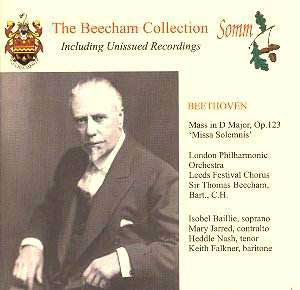Simply magnificent. I am sorely tempted to leave it
at that because no words of mine could ever convey the drama, the majesty,
the intimacy and unexpected depth of this live performance from the
1937 Leeds Triennial Music Festival, one of only two performances of
the Missa Solemnis that Beecham ever gave. I say unexpected because
of Beecham’s occasional penchant for Beethoven-bating but this is a
searing and extraordinary interpretation by which I was completely transfixed
throughout its entire length. The performance was given on the morning
of the 5th October and repeated in London a week later at
a Royal Philharmonic Society concert. The only change was that for the
London performance Harold Williams replaced Keith Falkner. Of course
it’s not necessarily for the most fastidious of ears – there are some
minor aural problems; considerable timpani overload in the Kyrie
and some negligible wear on the unique copies that have survived in
otherwise impressive condition. One is acutely aware of the care taken,
despite Beecham’s operatic reputation in this regard, to balance choir
and orchestra and properly to integrate the quartet of singers. As a
result the solo entries emerge, in the circumstances, with remarkable
fidelity. In the Gloria Isobel Baillie’s soaring beauty of tone
and Heddle Nash’s ardent tenor entwine with a naturalness only enhanced
by Falkner’s own noble entry. When Mary Jarred joins, lending her consummate
contralto, the quartet and the timbres and intensities of its singers
become apparent – Baillie, crystalline and pure, Nash, with his uniquely
expressive lyricism, Jarred’s affecting plangency and Falkner’s deeply
considered seriousness.
The Choir’s dynamic levels have clearly been well prepared
and for that, I suspect, considerable praise was due to Norman Strafford,
the Leeds Festival Choir’s Chorus Master. The choral singing is deeply
impressive – the equal or superior of any choir in the land at the time
– and with one or two slight hesitancies apart, unstinting in its overwhelming
contribution. The grandeur and sweep of the Gloria is momentous
but precise. The male choral entries are as dramatically strong – but
scaled – as the female; whereas in the Et Incarnatus est from
the Credo there is a corresponding raptness, an inwardness of
expression, which reveals itself most fully in the unravelling of solo
voices. There is no false piety here – Nash’s clarion declaration swells
and falls, hardens and darkens and leads to the benediction of Jarred’s
consoling contralto; listen to the strings here at 3’26 for their acute
support and maintenance of line. Et resurrexit opens with implacable
choral power and the LPO are here on superb form, supportive of the
decisiveness and concentratedness of Beecham’s conception. The Sanctus’s
affecting tread is followed by a long solo for leader David McCallum
in the Benedictus – his sweet, concentrated tone is entirely
apt for the vocal quartet’s extraordinary intimacies of expression –
the way Baillie succeeds McCallum at 2’35 is truly astonishing, as she
coils her tone to blend and fuse with his. Felicities of this kind abound
and continue in the Agnus Dei; Falkner may not be ideally secure
here initially but he grows in control, freely rolling his "r"
with the passion of a Prophet and spreading his solid baritone ever
outward. Mary Jarred is especially fine here in her passages before
and with Nash and one can see why she was so admired in her day and
deplore that she is so unjustly forgotten in our own. The concluding
Dona nobis pacem has been hard won, through strife and loss,
but the abruptness of its final triumphant orchestral close seems to
catch the Leeds audience by surprise.
This performance has been issued before, on Beecham
5, where it was coupled with a performance of Beethoven’s Second Symphony
from 1936, to join the three commercially recorded versions of the Symphony.
As for the Missa Solemnis it is now the earliest surviving performance
on record and one of the most incandescent and moving.
Jonathan Woolf


